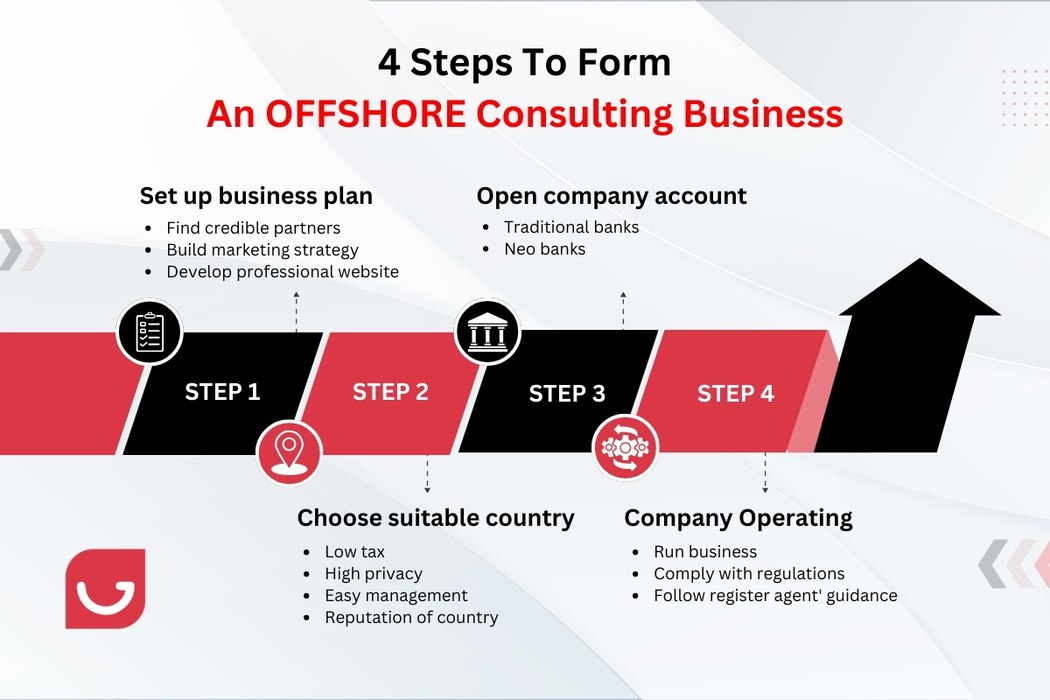Exploring the Providers Offered in Offshore Company Formations: What You Required to Know
Offshore company formations give a variety of solutions designed to promote business success while guaranteeing conformity with legal needs. These services can consist of firm enrollment, lawful suggestions, and arrangements for personal privacy through candidate supervisors. Furthermore, factors to consider around tax optimization and possession protection are critical. Recognizing these elements can considerably influence one's decision-making procedure. However, the intricacies of guiding and picking the ideal territory through guidelines elevate further inquiries. What should one take into consideration next?
Comprehending Offshore Firm Structures
What defines an overseas company structure? An offshore company is typically registered in a foreign jurisdiction, typically characterized by favorable regulatory environments and confidentiality. These structures are designed to provide legal splitting up in between the business's possessions and its proprietors, making it possible for a variety of operational and financial benefits. Offshore companies can be established as numerous kinds, including minimal responsibility business (LLCs), companies, or trust funds, relying on the regulative structure of the selected territory.
Secret functions of these structures include boosted privacy, asset defense, and simplicity of international business purchases. In addition, they frequently require very little local visibility and can assist in the management of financial investments throughout boundaries. The choice of a particular overseas jurisdiction can greatly affect the functional abilities and compliance requirements of the firm. Overall, recognizing the intricacies of overseas business frameworks is important for capitalists and entrepreneurs looking for to enhance their service techniques.
Tax Obligation Benefits of Offshore Companies
Offshore firms use considerable tax obligation benefits that can improve productivity and financial efficiency for local business owner. Among the primary benefits is the possibility for reduced business tax prices, which can be especially lower than those in the proprietor's home nation. Numerous offshore territories provide tax obligation rewards, such as tax obligation holidays or exemptions on particular types of earnings. In addition, offshore business might benefit from desirable tax treaties, permitting the reduction or removal of withholding taxes on returns, aristocracies, and interest. This can result in boosted cash money flow and much better reinvestment chances. Some offshore entities can operate under a territorial tax system, which only tax obligations earnings produced within that territory. This structure can be especially helpful for organizations participated in international trade or on the internet services, enabling them to optimize their tax obligation responsibilities while maintaining compliance with global regulations. Generally, these tax obligation benefits can significantly add to lasting monetary success.
Personal Privacy and Discretion Functions
Exactly how can service proprietors secure their sensitive information while gaining from international chances? Offshore business formations provide robust personal privacy and confidentiality features that appeal to business owners seeking discretion (Offshore Company Formations). Several jurisdictions offer candidate solutions, allowing people to assign 3rd parties as investors or directors, thus hiding their identities from public documents
Furthermore, strict information security laws in numerous overseas territories assure that sensitive info continues to be confidential. Offshore business frequently profit from improved financial privacy, with laws that secure client identifications and financial purchases.
The use of private addresses for signed up offices decreases exposure to public analysis.
These privacy procedures make it possible for company owner to run with higher confidence, recognizing their delicate data is safe and secure. By leveraging these attributes, entrepreneurs can concentrate on tactical growth possibilities without the constant issue of details direct exposure.
Asset Protection Approaches
While steering with the intricacies of international business, entrepreneurs should focus on property security to guard their wealth from prospective dangers. Offshore firm formations supply durable approaches for alleviating direct exposure to lawful cases, financial institution actions, and political instability. One effective method includes developing a minimal obligation company (LLC), which separates individual possessions from organization obligations, thereby providing a shield versus suits.
Furthermore, entrepreneurs can make use of depend hold possessions, ensuring they stay shielded from financial institutions and lawful conflicts. Jurisdictions with solid possession protection laws, such as Nevis or the Chef Islands, are frequently favored for their favorable laws. Applying appropriate insurance policy policies and expanding investments better boosts safety and security, decreasing vulnerability to market fluctuations. On the whole, making use of these methods within an offshore framework not just advertises riches preservation yet also cultivates long-lasting economic stability, permitting entrepreneurs to concentrate on growth and innovation without excessive issue over property exposure.

Opening Offshore Bank Accounts
Opening offshore savings account includes recognizing the numerous account kinds readily available, which can accommodate different financial requirements. In addition, the paperwork procedure is important, as it typically needs certain types of recognition and proof of home. This summary will clarify the alternatives and needs for people and services seeking to establish overseas banking relationships.
Account Types Provided
Offshore savings account been available in various kinds, each made to provide to different financial demands and goals. Personal accounts are customized for individuals looking for privacy and property security, while business accounts help with service transactions and monitoring of check this company funds. Multi-currency accounts are preferred amongst global financiers, enabling for transactions throughout different money without too much conversion charges. Additionally, interest-bearing accounts provide interest on down payments, appealing to those aiming to expand their assets safely. Some banks additionally offer financial investment accounts, supplying clients access to numerous financial investment possibilities. Each account type might come with unique advantages and features, permitting customers to select the one that lines up ideal with their financial approaches and objectives. Comprehending these alternatives is essential for efficient offshore banking.
Required Paperwork Process
To effectively open an offshore savings account, possible clients have to prepare a collection of specific papers that satisfy governing needs. This commonly includes a valid key or government-issued recognition to confirm identity. Customers are likewise required to provide evidence of house, such as an energy bill or financial institution declaration, dated within the last three months. Furthermore, a detailed description of the source of funds is required to ensure conformity with anti-money laundering laws. Some financial institutions might request a business plan or referral letters, especially for company accounts. Each jurisdiction may have distinct needs; as a result, speaking with a specialist in overseas solutions is suggested to determine all documentation is complete and exact, assisting in a smoother account opening procedure.
Compliance and Regulative Considerations
Navigating the intricacies of conformity and regulative factors to consider is crucial for any entity pursuing offshore business formations. Entities must abide by numerous international and regional legislations that regulate monetary activities, tax, and corporate administration. Trick guidelines typically include anti-money laundering (AML) regulations, understand your consumer (KYC) protocols, and reporting needs to ensure transparency.
Firms need to continue to be attentive about changes in legislation that might influence their functional status. Failing to comply can cause serious fines, including fines or the dissolution of the company. Involving with monetary and legal specialists who concentrate on offshore guidelines can offer critical support in steering through these details.
Additionally, recognizing the ramifications of tax obligation treaties and worldwide agreements is basic for maintaining conformity. Companies ought to prioritize developing robust compliance frameworks to mitigate dangers and ensure long-term sustainability in their offshore ventures.
Choosing the Right Offshore Jurisdiction
How does one establish one of the most suitable overseas jurisdiction for company formation? The selection of territory is important and includes numerous factors. First, one must assess the lawful framework and regulations governing companies in possible territories. Positive tax obligation regimens, such as reduced or zero business tax obligations, are usually a primary factor to consider. Furthermore, the political security and online reputation of the territory play considerable roles in making certain the security of properties and compliance with worldwide standards.
Moreover, the accessibility of banking services and the ease of doing business should not be neglected. A jurisdiction offering robust privacy arrangements can likewise be helpful for those looking for privacy. Lastly, reviewing the prices related to business development, maintenance, and potential lawful charges is vital. By considering these elements, one can make an informed choice, guaranteeing that the chosen offshore territory aligns with their company objectives and functional requirements.

Frequently Asked Concerns
Exactly how Lengthy Does the Offshore Company Formation Process Usually Take?

The offshore firm development procedure usually takes anywhere from a few days to a number of weeks. Offshore Company Formations. Elements influencing this timeline include territory, paperwork efficiency, and details solution suppliers associated with the development procedure
What Are the Initial Expenses Associated With Setting up an Offshore Firm?
The initial costs for establishing up an offshore business can vary widely, generally incorporating enrollment fees, lawful expenses, and added fees for services like bank account configuration and compliance, commonly totaling a number of hundred to several thousand bucks.
Can Individuals Kind Offshore Companies Without Specialist Support?
Individuals can practically form offshore business separately; nevertheless, they typically experience complex legal and governing demands. Offshore Company Formations. Professional help is advised to navigate these obstacles efficiently and assure compliance with pertinent laws and policies
What Papers Are Required for Offshore Company Enrollment?
The documents needed for overseas company enrollment usually consist of identification proof, a thorough service plan, proof of address, and, in some territories, a statement of advantageous possession and resolutions over at this website from supervisors.
Are There Recurring Maintenance Fees for Offshore Business?
Recurring maintenance charges for overseas firms are usually called for to ensure conformity with regional policies. These costs might include yearly renewal charges, registered representative solutions, and accounting, differing by jurisdiction and specific company structure.
